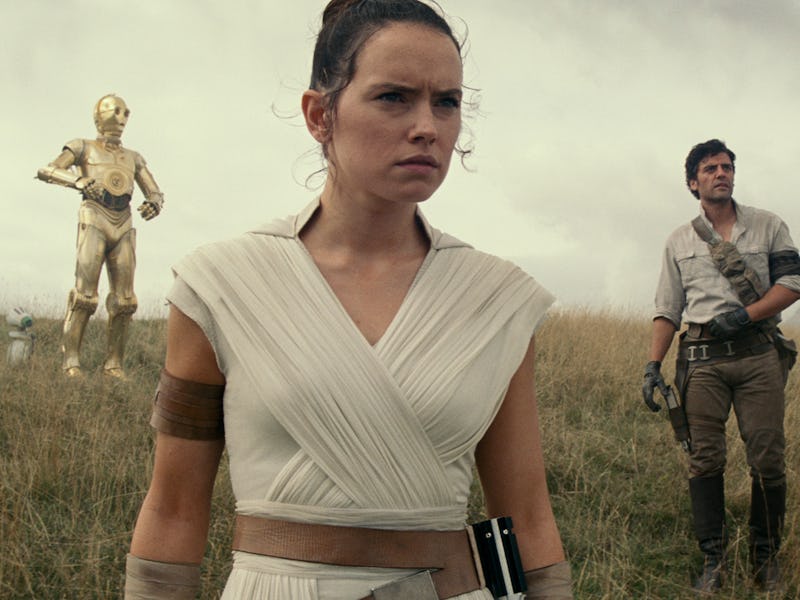3 lessons Disney should learn from its mistakes with 'Rise of Skywalker'
'Star Wars: Episode IX' highlights the lack of an overall plan for the sequels trilogy.

Even the guy who wrote The Rise of Skywalker admits that it’s a mess. In a recent interview, co-screenwriter Chris Terrio bemoaned the need to cram so much plot into a single movie, saying he wished they could have split it into two — but Terrio’s got it wrong. The problem with Rise of Skywalker isn’t that it’s too long or complicated, it’s that Disney bungled the entire sequels trilogy in an attempt to steer as far away from the mistakes of the prequels as possible.
Call it an overcorrection from the days of Jar Jar Binks and Midi-chlorians, but there’s no denying that Disney’s reign over the Star Wars galaxy has been bumpy so far, too say the least. With the sequels trilogy out of the way, however, Lucasfilm has a chance to finally get things right, but only if they learn from these recent mistakes.
Here are three lessons Disney and Lucasfilm need to learn from Rise of Skywalker and the sequels in general before rushing to make the next Star Wars movie.
Spoilers for Rise of Skywalker below, though at this point, we’d be disappointed if you haven’t seen it already.
Rey's story paralleled Luke and Anakin's.
3. Don’t retcon or course correct past films
When The Force Awakens debuted, it was clear the new sequels were trying to replicate the magic of the original Star Wars trilogy. The new trilogy was also trying to make up for the perceived mistakes of the prequels, moving away from CGI-laden visuals and favoring practical effects. Director J.J. Abrams brought in a new trio of actors to anchor the movies, and Rey’s journey heavily paralleled Luke Skywalker (and Anakin). The new Dark side antagonist, Kylo Ren, was even a Vader fanboy like so many members of the audience.
Rian Johnson’s The Last Jedi wasn’t interested in revisiting the past, but in moving the stories of these new characters forward, subverting the themes Star Wars fans had come to expect and pushing the trilogy in unexpected directions. Rey’s parents were “nobody,” Kylo broke his own Vader-inspired helmet, and Snoke died without a backstory or much motivation beyond just being evil.
The Rise of Skywalker then backpedaled on some of the more innovative elements of The Last Jedi. Rey isn’t a nobody, she’s Palpatine’s granddaughter. Kylo even repairs his own helmet, despite the fact that it would be totally useless in battle.
The message that anyone can be a Jedi was lost — it sort of happens with Finn, but his plot is muddled and half-baked — and it lessens the impact of the entire trilogy as a result. Moving forward, Disney needs to respect the vision of each director, and if something doesn’t work, well, that brings me to my next point…
Rose Tico all but disappeared in 'Rise of Skywalker'.
2. Have some sort of ending in mind from the start, and maintain character continuity across movies
Like with the original trilogy, each Star Wars sequel originally had its own director. Ideally, this opens up greater creative potential. On the other hand, changing directors without a clear endgame leaves storylines and character arcs incomplete. George Lucas was able to make stuff up on the fly (Vader, Luke, and Leia weren’t related when the first movie came out), but in the sequels, this lack of direction clearly shows.
The Rise of Skywalker made it clear that there was no blueprint and no overall plan for how to end the trilogy. It completely erased whole subplots and characters, like Rose, who was a big focus in The Last Jedi and all but disappeared in The Rise of Skywalker.
Thankfully, Disney doesn’t have to look far for a road map. Every Marvel movie has a different director, but under Kevin Feige’s creative leadership, each one clearly sets up an overarching storyline. Feige steers the MCU ship and decides which characters should remain central to the story, so as to avoid a Rose Tico situation. Individual directors are still allowed a good amount of creative freedom, despite playing in the same collective sandbox.
It’s easy to imagine how adopting a similar approach could benefit future Star Wars movies. Whether it’s Kathleen Kennedy or someone new, Star Wars needs a Kevin Feige. Or maybe just Feige himself.
If Palpatine can wait to execute his plans, so can Lucasfilm and Disney.
1. Don’t rush production, fans will wait
According to film editor Maryann Brandon, The Rise of Skywalker was a “no-win” situation because production was so rushed. In an interview with The Rough Cut podcast, Brandon says she edited the movie in a tent on-set while filming for Episode IX was ongoing, with Abrams joining her between takes to help edit.
Instead of pushing back the theatrical release date, the studio opted to rush the process to make the scheduled December 20 debut. That meant Brandon and Abrams had three months less time to edit Episode IX than they did on The Force Awakens. That was a mistake, evidenced by Rise of Skywalker’s strange pacing and head-scratching story choices.
Of course, Colin Trevorrow’s firing made the production more complicated, but Star Wars fans are loyal. We waited nearly two decades for the Star Wars prequels and another decade after that for the new trilogy. There’s no doubt that fans would’ve waited another year for Rise of Skywalker to get the time and attention it deserved.
Star Wars: The Rise of Skywalker is currently playing in theaters.